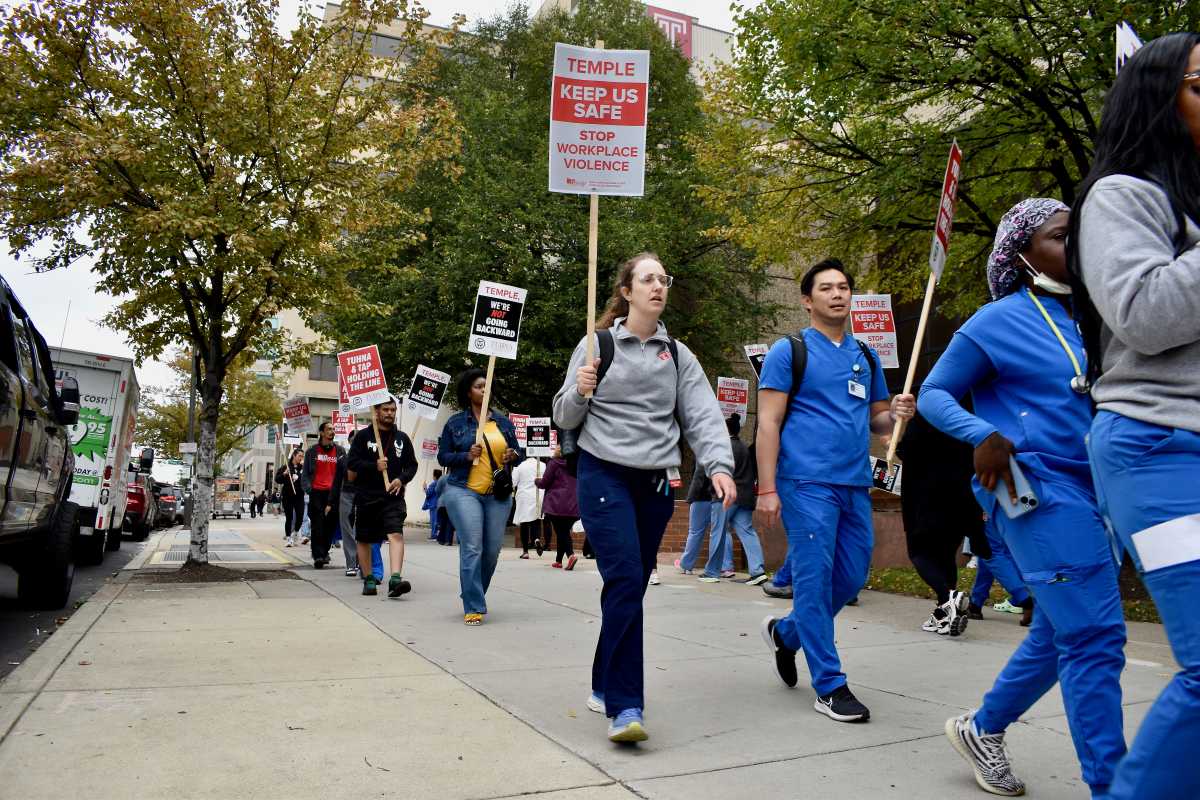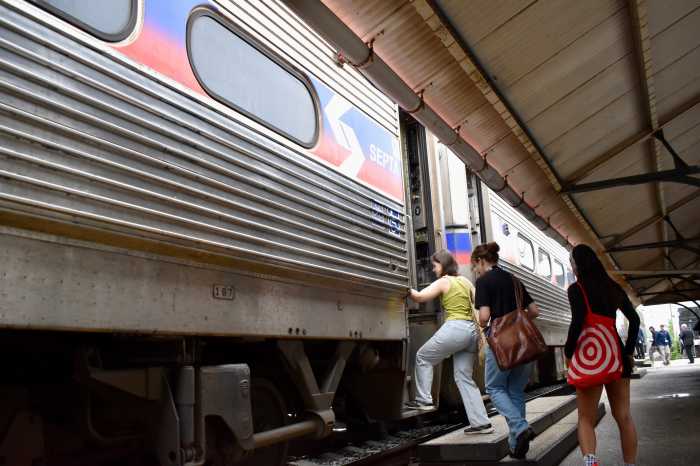Nurses and healthcare staff picketed Wednesday outside North Philadelphia’s Temple University Hospital – previewing a potential strike that could happen as soon as next month.
Contracts for the Temple University Hospital Nurses Association and Temple Allied Professionals, which collectively represent more than 2,600 employees, expire Sept. 30.
Demonstrations, known as “informational pickets,” were held simultaneously to raise awareness outside the main hospital on North Broad Street and the newly-opened Temple Women & Families Hospital in Northwood.
Workplace safety is a focus for the unions, and a lunchtime rally on the steps of the main hospital was accentuated by a personal account.
Erin Pastore, an emergency room nurse, recounted an experience from October 2024 when a patient attacked her and threatened to rape her.
Security had cleared a “combative patient” to be triaged. When Pastore attempted to put on a blood pressure cuff, he grabbed the back of her arm, threw her over the bed, smashed her face into the mattress and told her he intended to sexually assault her, she said.
Pastore was able to squirm for an inch of breathing room and yelled for help. At that point, a guard who had just left, returned and helped subdue the man. It was the sixth time she has been physically assaulted since she began working at Temple main in 2016.
“I am nervous every time I walk through the door after that episode,” Pastore said. “Every time I see a combative patient, I think, ‘Oh God, it’s going to happen.’ But I keep coming back because I just want to be here, and I want to show the community that we’re just as strong and we’re going to support them.”
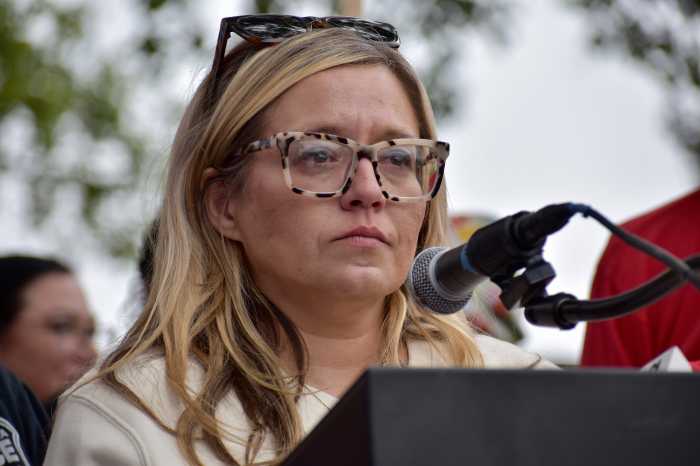
She was also among the many nurses, techs and employees who were on duty in the emergency department when the hospital went into ‘active shooter’ alert in July.
During that incident, patients and staff fled for cover when shots were heard near the ambulance bay. Although no one was hurt, employees felt hospital administrators downplayed the incident.
An August survey of nurses at Temple main found that two-thirds of respondents reported being the victims of workplace violence; nearly 80% said they do not feel safe; and 94% agreed that managers have not implemented sufficient safety protocols, according to the union.
“I’m tired of asking. It’s time for us to demand it,” TAP President Carlos Aviles said. “It’s time for us to make sure that when we settle this contract, we put things in place that will not give administrators that make millions and profit off of the work that we do the option to say ‘yes’ or ‘no’ to the basic things and necessities, including safety at the workplace.”
Union officials said that Temple has rejected a number of safety proposals put forth during negotiations, including hiring specialists trained in de-escalation and having security or police meet private vehicles that show up to the emergency room.
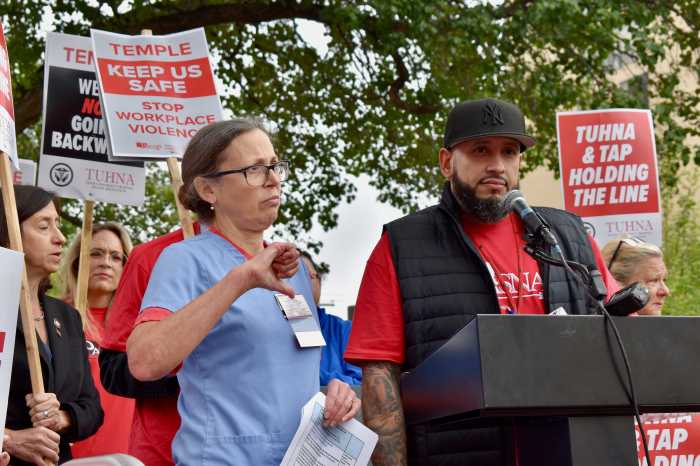
Temple Health, in a statement Wednesday, said “the safety of our patients and staff is our top priority.”
“We feel we’re having productive discussions on all the issues that the union has raised, and those discussions are ongoing as part of our regular labor relations process,” the health system continued. “Just like we’ve done in multiple other labor agreements this year, we’re confident this process will lead to a contract that does right by our employees and Temple Health and allows us to continue doing what we’re all here to do: provide our patients with the high-quality care they deserve.”
Both Temple unions are affiliated with the Pennsylvania Association of Staff Nurses and Allied Professionals, or PASNAP, which alleged that the Women & Families Hospital “opened with no clear plan.”
Among the other sticking points are pay and health benefits, union representatives said. Money should not be an issue, as Temple has recently invested millions to buy Redeemer Health’s ownership stake in Chestnut Hill Hospital and remake the Northwood facility, they argued.
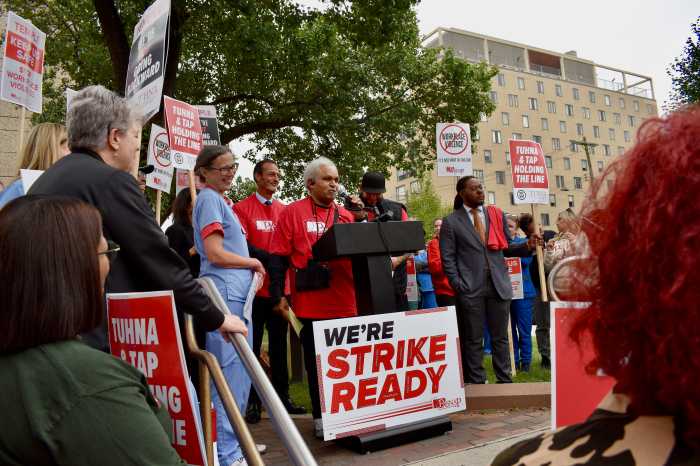
A few City Council members, along with former Mayor John Street, appeared at Wednesday’s rally to show support for the labor fight. Jimmy Harrity, an at-large lawmaker, said the unions are advocating for patients as much, if not more, than themselves.
“You care about them,” he told the picketers. “Because if it ain’t safe for you, it ain’t safe for them either.
“Temple, give these people a fair contract.”



